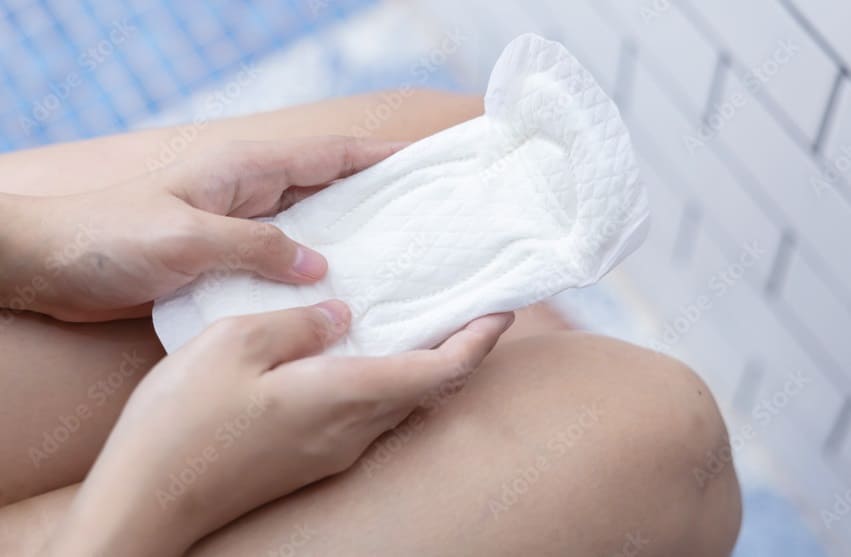Menstruation is a natural and essential part of a woman’s life, and for decades, sanitary pads have been a go-to option for menstrual hygiene. However, in recent years, concerns have surfaced about whether using sanitary pads could increase the risk of cancer. Are these concerns backed by science, or are they just myths? Let’s hear what the doctors have to say.
What Are Sanitary Pads Made Of?
Sanitary pads typically contain a combination of materials designed to absorb menstrual flow efficiently. These materials may include:
- Cotton or synthetic fibers: Used for absorbency and to provide a soft feel.
- Superabsorbent polymers: These gel-like substances help trap moisture and prevent leakage.
- Fragrance and deodorants: Sometimes added to reduce odor, though they can be irritating for some individuals.
- Plastic components: Found in the back layer to prevent leaks and provide structure.
- Dioxins and chemicals: Present due to the bleaching process used in some products.
- Adhesives: Used to keep the pad in place during wear.
Can Sanitary Pads During Periods Cause Cancer?
There is no solid scientific evidence linking sanitary pads to cancer, though concerns exist about dioxins, synthetic chemicals, and fragrances used in some products. Doctors recommend choosing organic or fragrance-free pads and practicing good menstrual hygiene to minimize potential risks.
The Concern: Do These Materials Pose a Cancer Risk?
The primary concerns regarding sanitary pads and cancer risk come from the presence of dioxins, synthetic chemicals, and fragrances. Let’s break them down:
1. Dioxins and Furans
Dioxins are byproducts of the bleaching process used in some sanitary pads. Studies indicate that prolonged exposure to high levels of dioxins can increase the risk of cancer. However, the trace amounts found in sanitary pads are significantly lower than harmful levels and are considered safe by health agencies like the FDA, WHO, and the Environmental Protection Agency (EPA).
Research shows that the dioxins found in sanitary pads are much lower than the levels people are exposed to through food, especially dairy, meat, and fish. According to experts, cumulative exposure to dioxins over time may be a concern, but the amounts in pads alone are unlikely to cause harm.
2. Fragrances and Chemicals
Some sanitary pads contain artificial fragrances, which may include chemicals like phthalates and parabens. These substances have been linked to hormonal disruptions and potential reproductive issues. However, there is no direct evidence that their presence in sanitary pads contributes to cancer development.
Parabens, in particular, are used as preservatives in many personal care products. Some studies suggest that they may have weak estrogenic activity, which could potentially influence hormone-related cancers. However, the small amounts found in pads make it unlikely to pose a significant risk.
3. Synthetic Fibers and Plastic Components
Some sanitary pads contain synthetic fibers and plastic layers that help prevent leakage. While these materials do not directly cause cancer, prolonged exposure to non-breathable plastics may contribute to skin irritation, rashes, or infections, which could lead to complications if not managed properly. Repeated exposure to chemicals in plastics, such as bisphenol A (BPA), has raised concerns in other products, but no solid evidence links them to sanitary pad usage and cancer.
What Do Doctors Say?
Most gynecologists and oncologists agree that the risk of cancer from using sanitary pads is minimal. Dr. Anjali Sharma, a renowned gynecologist, states, “The levels of dioxins in sanitary pads are negligible and not enough to cause harm. However, if you have sensitive skin, opting for organic, fragrance-free pads may be a better choice.”
Dr. Rajesh Verma, an oncologist, adds, “There is no scientific evidence that regular use of sanitary pads leads to cancer. The real risk factors for cervical or ovarian cancer include HPV infection, smoking, and genetic predisposition.”
Dr. Neha Kapoor, a dermatologist, points out that “Some women experience irritation and allergic reactions due to the synthetic materials and fragrances used in pads. Choosing pads with organic cotton and chemical-free ingredients can help minimize these reactions.”
Safe Menstrual Hygiene Practices
To minimize any potential risks, consider these tips:
- Choose chemical-free or organic sanitary pads if you have sensitive skin or concerns about chemical exposure.
- Change your pad every 4–6 hours to prevent bacterial infections and skin irritation.
- Avoid scented sanitary products to reduce the risk of allergic reactions and irritation.
- Consider alternative menstrual products, such as menstrual cups, organic tampons, or reusable cloth pads, if you’re concerned about the chemicals used in traditional pads.
- Store pads properly in a clean, dry place to avoid contamination.
- Wash hands before and after changing your pad to maintain hygiene and prevent infections.
- Check ingredient labels to ensure you’re using a product that aligns with your comfort and health preferences.
Are There Safer Alternatives?
If you are concerned about potential risks, several alternative menstrual products may offer a safer and more environmentally friendly option:
- Organic Cotton Pads: These pads are made with unbleached, natural cotton and contain no synthetic additives.
- Menstrual Cups: Made from medical-grade silicone or rubber, they do not contain dioxins or synthetic chemicals.
- Cloth Pads: Reusable and washable, these pads reduce waste and eliminate exposure to harmful chemicals.
- Period Underwear: Specially designed to absorb menstrual flow without additional products.
Final Verdict: Myth or Reality?
There is no solid scientific evidence linking sanitary pads to cancer. While concerns about dioxins, synthetic chemicals, and plastic components exist, the levels present in pads are too low to cause harm. Practicing good menstrual hygiene, staying informed about the products you use, and choosing high-quality, safe alternatives can help ensure comfort and health during your period.
Also Read:
